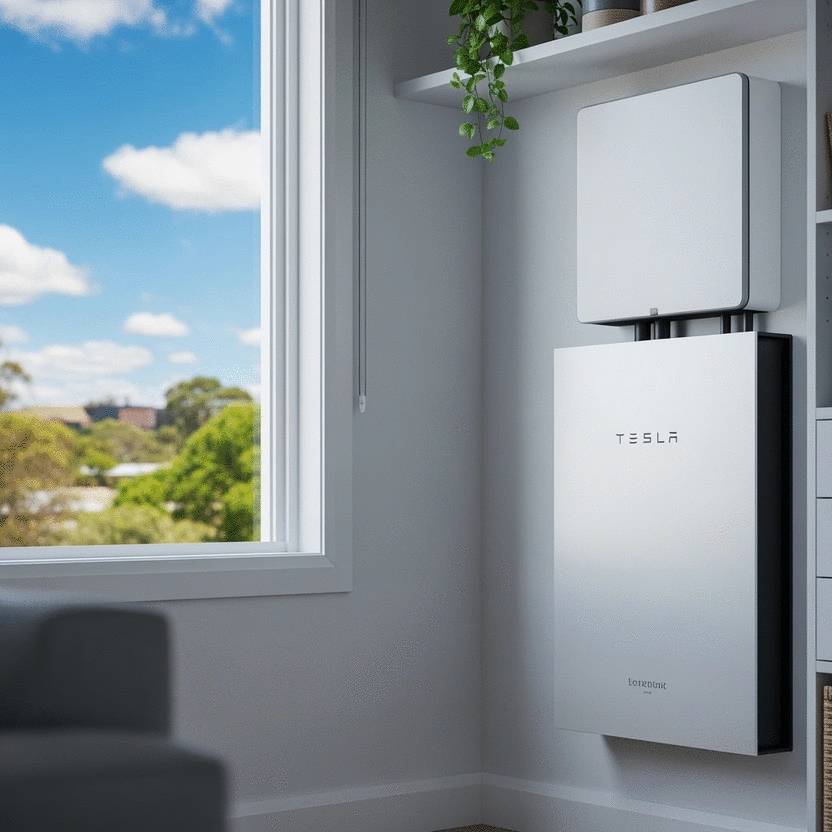Oct 17
Selecting Solar Batteries for Adelaide Homes
Are you aware that choosing the right solar battery can significantly impact your energy independence and cost savings? This guide will illuminate the crucial aspects to consider before making such an important investment.
What You Will Learn
- The role of solar batteries in maximizing energy storage and reducing reliance on the grid.
- Key factors to evaluate when selecting a solar battery, including capacity, type, and warranty.
- Benefits of achieving energy independence through solar battery usage, such as cost stability and resilience.
- Essential safety features to look for in solar batteries, including Battery Management Systems and adherence to UL safety standards.
Why Solar Batteries Matter: Key Benefits & Safety Features
This visual highlights the essential benefits that solar batteries offer to homeowners and the critical safety features that ensure their reliable operation.
Key Benefits of Solar Batteries
- Energy Storage: Store excess energy for later use.
- Cost Savings: Lower bills by using stored energy during peak rates.
- Backup Power: Maintain power during outages.
- Environmental Impact: Reduce carbon footprint.
Essential Safety Features
- Battery Management System (BMS): Monitors and protects battery health.
- Thermal Management: Prevents overheating and thermal runaway.
- UL Safety Standards: Compliance with UL 1973 & UL 1642.
- Battery Type Specifics: Differences for Lithium-Ion vs. Lead-Acid.
Understanding the Importance of Choosing the Right Solar Battery for Your Adelaide Home
As an Adelaide homeowner considering solar energy, you might wonder about the significance of selecting the right solar battery. It's crucial to understand that a solar battery can greatly influence how effectively you harness and store energy from your solar panels. A good battery not only stores excess energy but also ensures you have power during peak usage times or outages, making your home more energy independent! For more information on renewable energy in South Australia, you can visit the Energy and Mining website of South Australia.
Investing in a solar battery is not just about the initial cost; it's about long-term savings, energy efficiency, and sustainability. By choosing the right solution, you can significantly reduce your reliance on the grid and take control of your energy bills. For details on solar photovoltaic systems and energy-efficient home design, refer to SA.GOV.AU.
Why Solar Batteries Matter for Homeowners
Solar batteries play a vital role in maximizing the benefits of your solar panel system. They allow you to store energy generated during the day for use at night or during cloudy days. Here are some key reasons why solar batteries matter:
- Energy Storage: Store excess energy for later use.
- Cost Savings: Lower your energy bills by using stored energy during peak rates.
- Backup Power: Maintain power during outages, ensuring your home's continuity.
- Environmental Impact: Further reduce your carbon footprint by using renewable energy.
With these advantages, it's no wonder homeowners are increasingly looking into integrating solar batteries into their systems. Are you ready to explore how a solar battery can empower your home?
Key Factors to Consider Before Making a Purchase
Before diving into the solar battery market, it's essential to consider several factors that will impact your decision. Here are the most crucial elements to keep in mind:
- Capacity: Ensure the battery can store enough energy to meet your needs.
- Type: Different battery types (like Lithium-Ion vs. Lead-Acid) have unique benefits.
- Warranty: Look for a battery with a solid warranty to protect your investment.
- Installation Costs: Factor in the costs associated with installation alongside the battery price.
By evaluating these elements, you can make a more informed choice that suits your household's energy requirements. It's all about setting yourself up for success!
Understanding Energy Independence and Its Benefits
Energy independence means having control over your energy resources, and solar batteries are a significant step toward achieving this. When you can store and use your solar energy, you become less reliant on external energy sources. This independence not only protects you from fluctuating energy costs but also provides peace of mind during outages. The Australian government also provides information on batteries and clean energy initiatives.
Here are some benefits of achieving energy independence:
- Cost Stability: Lock in your energy costs and avoid rising electricity rates.
- Resilience: Prepare for unexpected outages and ensure your home remains powered.
- Environmental Benefits: Contribute to a cleaner environment by utilizing renewable energy sources.
- Empowerment: Take control of your energy future and make sustainable choices.
At Adelaide Solar Info, we believe that every homeowner should experience the freedom that comes with energy independence. Are you feeling inspired to take that leap?
Pro Tip
When selecting a solar battery, always check for compatibility with your existing solar panel system. This ensures optimal performance and efficiency, allowing you to maximize your energy savings in the long run!
Essential Safety Features of Solar Batteries
When it comes to solar batteries, safety should be a top priority for every homeowner in Adelaide. These devices store energy for use during off-peak hours, and understanding the safety features they offer can help ensure a secure investment. Let's explore the essential safety features that every solar battery should possess to provide peace of mind.
By staying informed about safety features, you can confidently choose a battery that meets both your energy needs and safety standards. Below, I’ve outlined some key aspects to consider.
What Is Battery Management System (BMS) and Why It’s Critical
A Battery Management System (BMS) is a vital component of solar battery technology. It monitors and manages the battery’s health, ensuring optimal performance and safety. The BMS tracks parameters such as voltage, temperature, and charge levels to prevent overcharging and overheating.
- Monitoring: Continuously checks battery conditions.
- Protection: Prevents damage from excessive charge or discharge.
- Longevity: Extends battery lifespan by optimizing usage.
Choosing a battery with a reliable BMS is essential for ensuring both safety and efficiency. It can help mitigate risks and improve the overall performance of your solar energy system.
How To Prevent Thermal Runaway and Ensure Fire Safety
Thermal runaway is a serious concern when it comes to battery safety, especially with lithium-ion batteries. This phenomenon occurs when a battery overheats, leading to potentially dangerous situations. To prevent thermal runaway, it's important to select batteries with features designed to manage heat effectively.
- Look for batteries with built-in cooling systems.
- Choose models that have protective casings to contain heat.
- Ensure proper ventilation in the installation area.
By taking these precautions, you can significantly reduce the risk of fire hazards associated with solar batteries. Always prioritize fire safety when selecting your solar battery.
Understanding UL Safety Standards: UL 1973 and UL 1642
Familiarizing yourself with safety standards like UL 1973 and UL 1642 is crucial for selecting a safe solar battery. These standards indicate that a battery has undergone rigorous testing for safety and performance.
- UL 1973: Focuses on energy storage systems, ensuring performance under various conditions.
- UL 1642: Specifically covers lithium batteries, addressing safety concerns related to overheating and explosions.
By choosing batteries that comply with these standards, you can rest assured that you've made a safe choice for your home. It’s a critical aspect to consider, especially for eco-conscious homeowners in Adelaide.
Safety Standards for Different Battery Types: Lithium-Ion vs. Lead-Acid
Each type of solar battery has its own safety characteristics. Understanding these can help you make an informed decision. Let's compare lithium-ion and lead-acid batteries in terms of safety.
- Lithium-Ion: Generally considered safer due to advanced BMS technology, but still requires monitoring for overheating.
- Lead-Acid: More robust in terms of chemical stability, but can emit gas and may require more maintenance.
Knowing these differences is essential when deciding which battery type aligns with your safety expectations and energy needs. At Adelaide Solar Info, we emphasize selecting the battery that fits your lifestyle while ensuring maximum safety.
Frequently Asked Questions (FAQs) About Solar Batteries
What are the main benefits of installing a solar battery?
Solar batteries offer key benefits such as energy storage for later use, cost savings by utilizing stored energy during peak rates, backup power during outages, and a reduced carbon footprint, contributing to environmental conservation.
What factors should I consider when choosing a solar battery?
When choosing a solar battery, consider its capacity to meet your energy needs, the battery type (e.g., Lithium-Ion vs. Lead-Acid), the warranty provided, and the overall installation costs. These factors ensure an informed decision tailored to your household.
What is energy independence and how do solar batteries contribute to it?
Energy independence means having control over your energy resources and being less reliant on external grids. Solar batteries enable this by storing solar energy for your use, offering cost stability, resilience during outages, and empowering you to make sustainable energy choices.
Why is a Battery Management System (BMS) important for solar batteries?
A BMS is critical because it monitors and manages the battery's health, including voltage, temperature, and charge levels. It prevents overcharging and overheating, thereby ensuring optimal performance, safety, and extending the lifespan of the battery.
What safety standards should a solar battery comply with?
A safe solar battery should comply with UL safety standards like UL 1973 (for energy storage systems) and UL 1642 (specifically for lithium batteries). These standards confirm that the battery has undergone rigorous testing for safety and performance, ensuring peace of mind for homeowners.
Recap of Key Points
Here is a quick recap of the important points discussed in the article:
- Energy Storage: Solar batteries allow you to store excess energy for use during peak times or outages.
- Cost Savings: Using stored energy during high-rate periods can significantly lower your energy bills.
- Safety Features: Prioritize batteries with robust Battery Management Systems (BMS) and compliance with UL safety standards.
- Capacity and Type: Consider the battery's capacity and type (Lithium-Ion vs. Lead-Acid) to meet your energy needs.
- Energy Independence: Achieving energy independence reduces reliance on the grid and stabilizes your energy costs.

Liam Fairfax
Solar Energy Advocate. Renewable Energy Expert. Sustainability Enthusiast.
Liam Fairfax is dedicated to transforming Adelaide homes with efficient, sustainable solar power, empowering homeowners and eco-conscious residents to embrace a brighter, greener future. Join him on our blog for valuable insights and practical advice that simplify your solar journey and enhance your energy independence.


